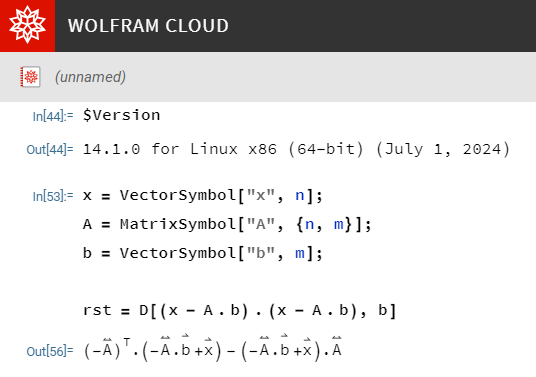As an example, I'd like to calculate this symbolic derivative:
$\frac{\partial}{\partial b}(x-A.b)^{\mathsf{T}}.(x-A.b)$
where $x$ and $b$ are vectors and $A$ is a matrix.
What I tried is this:
Clear[x, a, b, n, m]
$Assumptions = {x ∈ Vectors[n, Reals], a ∈ Matrices[{n, m}], b ∈ Vectors[m, Reals]}
expr = TensorReduce[(x - a.b).(x - a.b)]
The value returned by TensorReduce looks ok, in the sense that TensorRank and TensorDimensions return 0 and {} as expected for a scalar, and when I use replacement rules to replace x, a, b with proper-sized arrays, I get the expected result.
However, when I write:
D[expr, b]
I get the expression: -2 x.a.1 + a.1.a.b + a.b.a.1. Looking at this expression, I can sort of guess what the derivative should look like, but I can't use it in code like that. For example, I can't use TensorDimensions to get the derivative's dimension, and I can't use replacement rules to insert arrays in place of the symbolic tensors.
ADD:
I've also tried using TensorProduct/TensorContract instead of Dot:
xmab = TensorReduce[x - TensorContract[TensorProduct[a, b], {{2, 3}}]];
expr = TensorReduce[
TensorContract[TensorProduct[xmab, xmab], {{1, 2}}]];
This gives a sensible looking expr, but I think D doesn't work with TensorProduct/TensorContract:
D[expr, {b, 1}]
-2 (TensorContract^(1,{{0,0},{0,0}}))[a[TensorProduct]b[TensorProduct]x,{{1,4},{2,3}}] (TensorProduct^(0,1,0))[a,b,x]+(TensorContract^(1,{{0,0},{0,0},{0,0}}))[a[TensorProduct]a[TensorProduct]b[TensorProduct]b,{{1,3},{2,6},{4,5}}] ((TensorProduct^(0,0,0,1))[a,a,b,b]+(TensorProduct^(0,0,1,0))[a,a,b,b])


D) don't work with tensors.Dseems to work withDot, but it does give a weird looking result that I don't understand:1 . x(anyone copying this, note the space around the.). This type of expression will never evaluate1 . 2or1 . {1,2}. I would have expectedDotto act asTimeswith scalars ... $\endgroup$Dt[f.g, x]isf.Dt[g, x] + Dt[f, x].g: MMA seems to apply the product rule toDot, so I'd say the1in1 . xshould be the JacobianD[x,x], i.e.IdentityMatrix. (Did that make sense?). So I could probably safely replaceDot[x_,1] -> x. But I can't get the transpositions right, becauseDdoesn't seem to work withTranspose,Transposedoesn't distribute over sums and so on. $\endgroup$